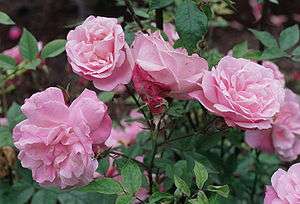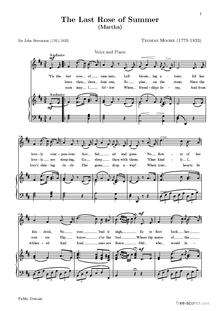The Last Rose of Summer
 |
|
| Problems playing this file? See media help. | |

"The Last Rose of Summer" is a poem by the Irish poet Thomas Moore. He wrote it in 1805, while staying at Jenkinstown Park in County Kilkenny, Ireland, where he was said to have been inspired by a specimen of Rosa 'Old Blush'. [1] The poem is set to a traditional tune called "Aislean an Oigfear", or "The Young Man's Dream",[2] which was transcribed by Edward Bunting in 1792, based on a performance by harper Denis Hempson (Donnchadh Ó hÁmsaigh) at the Belfast Harp Festival.[3] The poem and the tune together were published in December 1813 in volume 5 of Thomas Moore's A Selection of Irish Melodies. The original piano accompaniment was written by John Andrew Stevenson, several other arrangements followed in the 19th and 20th century.
Poem

'Tis the last rose of summer,
Left blooming alone;
All her lovely companions
Are faded and gone;
No flower of her kindred,
No rosebud is nigh,
To reflect back her blushes,
Or give sigh for sigh.
I'll not leave thee, thou lone one!
To pine on the stem;
Since the lovely are sleeping,
Go, sleep thou with them.
Thus kindly I scatter,
Thy leaves o'er the bed,
Where thy mates of the garden
Lie scentless and dead.
So soon may I follow,
When friendships decay,
And from Love's shining circle
The gems drop away.
When true hearts lie withered,
And fond ones are flown,
Oh! who would inhabit
This bleak world alone?
Musical settings
Classical
The following is an incomplete selection of "theme and variations" created during the 19th and 20th centuries.
- Ludwig van Beethoven used "The Last Rose of Summer" twice:
- as no. 6 "Sad and Luckless was the Season" in volume 2 of his Irish Songs WoO 153 (written 1814, published 1816)
- as no. 4 of his Six National Airs with Variations op. 105 for flute and piano (composed 1818, published 1819)
- Ferdinand Ries: Grand sestetto ... in which is introduced the admired air 'The Last Rose Summer' op. 100, for string quartet, double bass, piano (1819)
- Friedrich Kalkbrenner: Eighth Fantasia for the piano forte in which is introduced a favourite Irish melody op. 50, for piano (1821)
- Charles Bochsa: Fantaisie et variations sur un air favori irlandais, for harp (1822)
- Mauro Giuliani: No. 2 of Six Airs irlandois nationales variés op. 125, for guitar (c.1825)
- Ignaz Moscheles: The Recollections of Ireland op. 69, for piano and orchestra (1826)
- Felix Mendelssohn: Fantasia on 'The Last Rose of Summer' op. 15, for piano (c.1827)
- Jean-Louis Tulou: Souvenir anglais op. 51, for 2 flutes and piano (1828)
- Friedrich Kuhlau: Variations on an Irish Folksong op. 105, for flute and piano (1829)
- Kaspar Kummer: Des Sommers letzte Rose, no. 6 in: Transcriptionen über beliebte Themen op. 57, for 2 flutes (1829)
- Henri Herz: The Last Rose of Summer op. 159, for piano (1842)
- William Vincent Wallace: The Last Rose of Summer (1846)
- Friedrich von Flotow: aria "Letzte Rose" in the opera Martha (1847)
- Charles Mayer: La Dernière rose. Fantaisie variée, for piano (mid-1840s)
- Mikhail Glinka: Theme ecossais varie based on the Irish tune 'The Last Rose of Summer', for piano (1847)
- Joseph Joachim Raff: The Last Rose of Summer. La Dernière rose. Impromptu op. 46, for piano (1849)
- August Neithardt(de): Des Sommers letzte Rose op. 141 no. 3, for mixed choir (1850)
- Brinley Richards: The Last Rose of Summer op. 45, for piano (1853)
- Charles Oberthür: Fantaisie brillante, on motives of Flotow's Martha, introducing the air 'The Last Rose of Summer' op. 116, for harp (1854)
- Sigismond Thalberg: The Last Rose of Summer. Air irlandais varié op. 73, for piano (1857)
- Henri Vieuxtemps: No. 5 of Bouquet Americain op. 33 ("Dernière rose de l'été"), for violin and piano (1860)
- Heinrich Wilhelm Ernst: No. 6 of Sechs mehrstimmige Etüden (Six Polyphonic Studies): Variations on 'The Last Rose of Summer', for violin solo (1865)
- Joseph O'Kelly: La Dernière rose; no. 6 of Les Soirées enfantines, 2nd series, versions for piano solo and 4-hands (1866)
- Jules Danbé: La Dernière rose. Mélodie irlandaise, fantaisie, for violin and piano (1870)
- Charles Gounod: The Last Rose of Summer, for mixed choir (1873)
- Sydney Smith: The Last Rose of Summer. Paraphrase de concert op. 173, for piano (c.1880)
- Félix Godefroid: La Dernière rose d'été. Mélodie irlandaise, for harp (1891)
- Max Reger: Vierstimmiger Kanon über das Lied 'Letzte Rose', for piano (1903)
- Paul Hindemith alluded to both words and music in his On Hearing 'The Last Rose of Summer', part of Nine English Songs (1944)
- Benjamin Britten: no. 9 of Folksong Arrangements, vol. 4: Moore's Irish Melodies (1958)
Popular
- In Japan, the melody is widely known as the song Niwa-no-Chigusa (庭の千草), meaning "The Plants in the Garden". The poem was adapted by Tadashi Satomi (1824–1886) and published as part of Songs for the Elementary School (book III) in 1884 by the Educational Ministry.
- Judas Priest recorded a song entitled "Last Rose of Summer" on their 1977 album Sin After Sin. Written by Rob Halford and Glenn Tipton, the song is all about "unyielding love".
- Clannad released a rendition of "The Last Rose of Summer" on their 1980 album Crann Úll.
- The poem is alluded to in the Grateful Dead song "Black Muddy River", which is sung to the original tune, on their 1987 album In the Dark.
- Sarah Brightman recorded "The Last Rose of Summer" for her 1988 album The Trees They Grow So High.
- Tom Waits included a song entitled "The Last Rose of Summer" on his 1993 album The Black Rider, based on the eponymous stage production by Waits, Robert Wilson (director) and William S. Burroughs. In it, the singer talks about the petals of his "favourite rose" being shrouded "in shadows dark and long". The song ends with the lines: "I can be found in the garden singing this song / When the last rose of summer is gone".
- Charlotte Church recorded "The Last Rose of Summer" on her 1999 album Charlotte Church.
- The Irish Tenors covered the song on their 2000 CD/DVD release Live in Belfast.
- It is sung in the musical group Celtic Woman by Méav Ní Mhaolchatha and Hayley Westenra. Chloë Agnew's solo version is recorded on her 2002 album Chloë. Ní Mhaolchatha's solo version is included in her 2006 A Celtic Journey album. In the 2007 Celtic Woman: A New Journey tours, Agnew sang duets with Ní Mhaolchatha, Westenra, and the vocalist-guitarist of the same group, Lynn Hilary.
- James Galway: Over the Sea to Skye – The Celtic Connection, James Galway & The Chieftains (2009).
- In 2010, Fionnuala Sherry of the New Instrumental duo Secret Garden released a version of the song titled "The Last Rose" on her solo debut album Songs From Before.
- Laura Wright recorded a version, featured on her album The Last Rose (2011).
- Anna Meredith recorded a version as "Last Rose" featured on her album "Varmints (album)" (2016).
Literary allusions
This poem is mentioned in Jules Verne's 1884 novel The Vanished Diamond (aka. The Southern Star), and by Wilkie Collins in The Moonstone (1868), in which Sergeant Cuff whistles the tune frequently.
The song is mentioned by James Joyce in Ulysses.[4] It is also referred to, disdainfully, in George Eliot's Middlemarch.
The song also mentioned in Rupert Hughes's 1914 book by the same name, The Last Rose of Summer, and by Betty Smith in her 1943 novel A Tree Grows in Brooklyn.
Film, television and radio
A British silent movie of The Last Rose of Summer made in 1920 stars Owen Nares and Daisy Burrell.[5]
Deanna Durbin sings the song in the 1939 film, Three Smart Girls Grow Up.[6]
In the 1941 film Here Comes Mr. Jordan it is the character Joe Pendelton's inability to play "The Last Rose of Summer" on his saxophone anything other than badly that allows him to prove that he is alive in another man's body; all the other characters think he is the dead man from whom he got the body, but when he plays the sax for his old boxing manager, he uses the same wrong note in the melody as he always did, and which thus confirms his story of coming back from the after-life.
In the 1944 film Gaslight the melody is associated with the opera singer Alice Alquist, the murdered aunt of the protagonist, Paula (Ingrid Bergman).
In the 1953 I Love Lucy episode "Never Do Business With Friends" (Season 2, Episode 31), Ethel Mertz (played by Vivian Vance) sings the first lines of this song while doing housework.
This song is heard played on a 19.5/8-inch upright Polyphon musical box as Katie Johnson is walking to/away from the police station at the start/end of the 1955 Alec Guinness film The Ladykillers.
The Last Rose of Summer was also the title (later revised as Dying of Paradise) of a three-hour science fiction production written by Stephen Gallagher in 1977-78 for Piccadilly Radio.
In the 1983-1984 Japanese TV drama Oshin, broadcast on NHK, the melody is played on harmonica by characters.
In the 1995 film An Awfully Big Adventure, the song is used as P.L. O'Hara's theme music and is a recurrent musical motif in the film's score.
The song was featured in Ric Burns' documentary series, New York: A Documentary Film (1999–2003), broadcast on PBS in the USA.
In the 2000 Thai western film Tears of the Black Tiger (Thai: ฟ้าทะลายโจร, or Fa Thalai Chon), translated version of the song called "Kamsuanjan" ("The Moon Lament") was used as the closing song concurrent with the tragic ending of the film.
In the 16th (final) episode of the 6th season (2009) of the UK Channel 4 television show Shameless, the song was sung by Jamie Maguire (played by Aaron McCusker) at the funeral of his sister Mandy Maguire (Samantha Siddall).
The song was featured in FOX TV series,"The Chicago Code" Season 1 Episode 2, "Hog Butcher" (February 2011). This traditional Irish song was sung by Jason Bayle, as the uniformed officer during the memorial service of fallen Chicago police officer Antonio Betz.
In Rooster Teeth Productions' RWBY web series, the name of Summer Rose is a direct reference to the poem. The thirteenth line, "Thus Kindly I Scatter", is used as the epitaph on her gravestone in the trailer "Red" and episodes one and twelve of the third season (2015).[7]
Games
The song was used in the game Endless Ocean 2: Adventures of the Deep as the theme of the Depths area of the Zahhab Region. It is also playable on the jukebox that the player can purchase in-game.
In Hangar 13 game, Mafia 3, the character, Burke can be heard singing this song with sorrow.
Notes
- ↑ http://www.garden.ie/article.aspx?id=979
- ↑ Walton's, editors (1993). Ireland - The Songs Book 4.
- ↑ Edward Bunting, A General Collection of the Ancient Irish Music (1796)
- ↑ "Ulysses by James Joyce: The Last Rose of Summer, accessed 29 June 2009
- ↑ Kenton Bamford, Distorted images: British national identity and film in the 1920s (1999), p. 8
- ↑ "Three Smart Girls Grow Up". Deanna Durbin Devotees. Retrieved 9 July 2013.
- ↑ http://roosterteeth.com/episode/rwby-season-3-chapter-1
Audio clips
External links
![]() Works related to The Last Rose of Summer at Wikisource
Works related to The Last Rose of Summer at Wikisource
